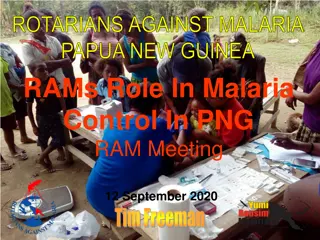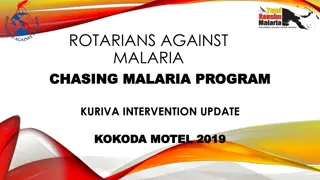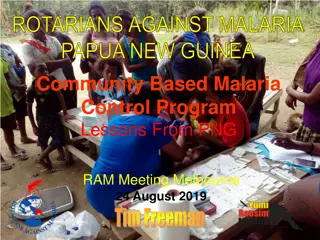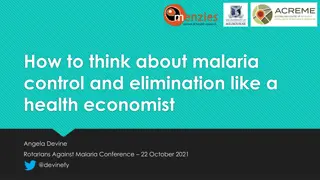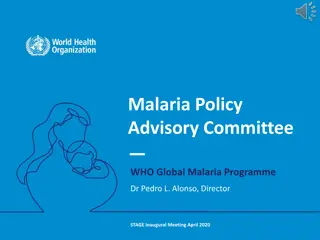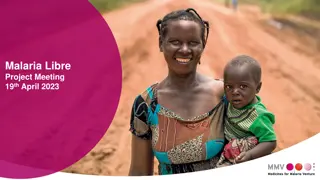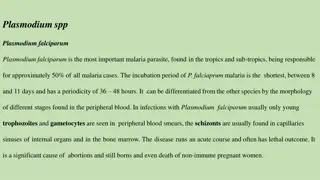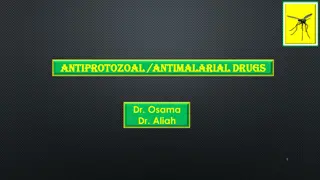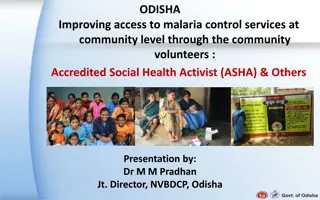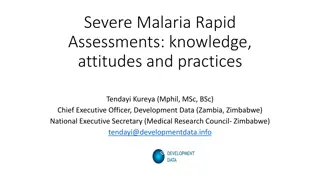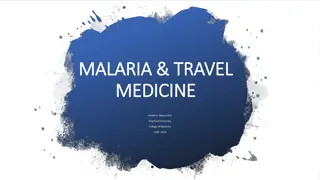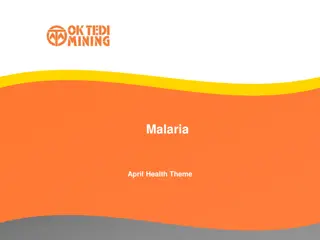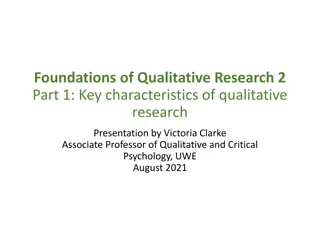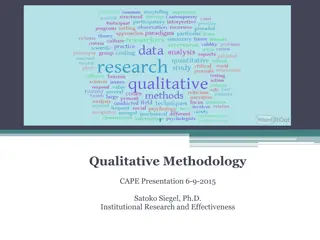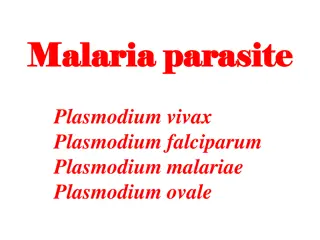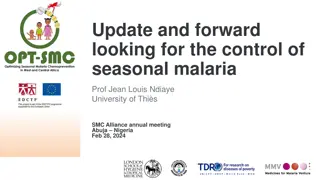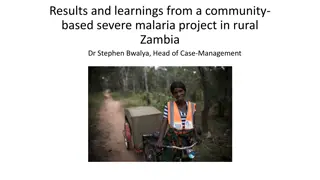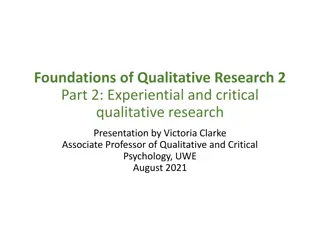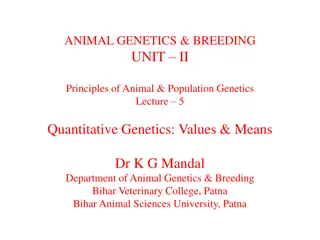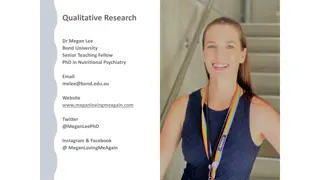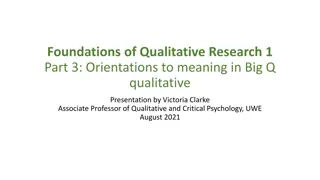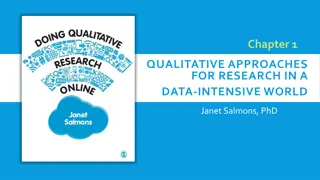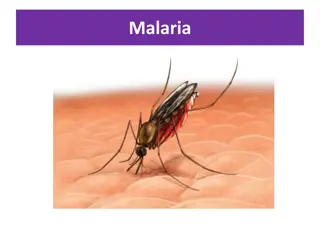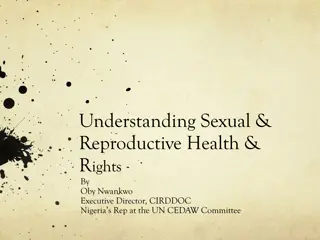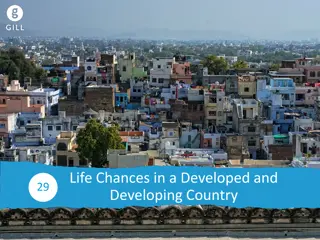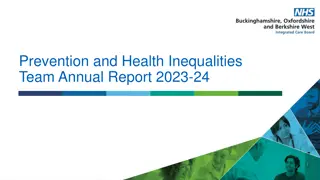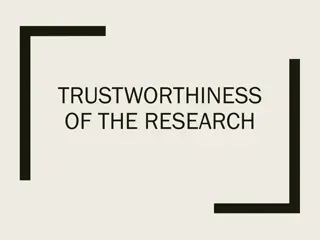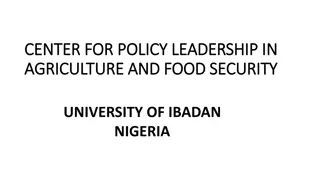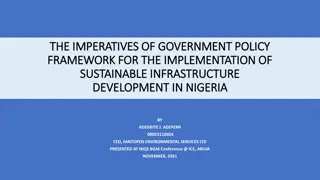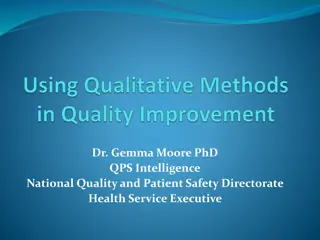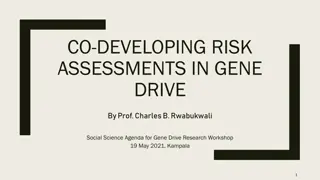Understanding Challenges in Malaria Prevention in Nigeria: A Qualitative Study
This study focuses on identifying facilitators and barriers to the uptake of Seasonal Malaria Chemoprevention (SMC) among children aged 3-59 months in selected states of Nigeria. Through key informant interviews, in-depth interviews, and focus group discussions, the research aims to analyze factors such as caregiver knowledge of malaria, perceived effects of SMC on children's health, attitudes towards SMC, preferences for delivery methods and locations, and health workers' experiences with SMC delivery. The ultimate vision is to contribute to a malaria-free Nigeria and reduce malaria-related mortality.
Download Presentation

Please find below an Image/Link to download the presentation.
The content on the website is provided AS IS for your information and personal use only. It may not be sold, licensed, or shared on other websites without obtaining consent from the author. Download presentation by click this link. If you encounter any issues during the download, it is possible that the publisher has removed the file from their server.
E N D
Presentation Transcript
R E S E A C H O N S M C I N N I G E R I A Our Vision Our Vision - - a malaria free Nigeria; a malaria free Nigeria; Our goal Our goal to reduce malaria burden to pre to reduce malaria burden to pre- -elimination levels and bring malaria elimination levels and bring malaria- -related mortality to zero related mortality to zero N a t i o n a l M a l a r i a E l i m i n a t i o n P r o g r a m m e
Facilitators and Barriers to Uptake of Seasonal Malaria Chemoprevention (SMC) in Nigeria: A Qualitative Approach
Study Objectives Aim is to determine facilitators and barriers to uptake of SMC among children aged 3-59months in selected States in Nigeria Specifically, i. knowledge of malaria whether it affects uptake of SMC, and to examine ii. perceived effect of SMC on their children's health, iii. experiences and attitudes of caregivers concerning the concept of SMC, iv. experiences and attitudes of caregivers concerning the regimen of the chemoprevention v. preferred mode of delivery/place of administration of SMC by caregivers vi. health workers attitudes and experiences regarding delivery of SMC vii. to determine if (ii)-(vi) above affects uptake of SMC Our Vision Our Vision - - a malaria free Nigeria; a malaria free Nigeria; Our goal Our goal to reduce malaria burden to pre to reduce malaria burden to pre- -elimination levels and bring malaria elimination levels and bring malaria- -related mortality to zero related mortality to zero
Methodology Purposively selected 5 States: Kano, Kebbi, Kwara, Nasarawa & Yobe Two LGAs in each State Two Wards/Communities in each LGA Based on geopolitical zone/partner mapping/No. of years of implementation/performance in SMC 2021 round/rural and urban setting Study Population: Caregivers-mothers and fathers (slit into those who could write and read and those who could not) Community-Directed Distributors (CDDs) Community Leaders LGA Malaria Focal Person Director of Public Health/Disease Control and Malaria Programme Manager National Programme Officers/Partners: National Coordinator NMEP, Malaria Consortium, WHO, PMI, GF Our Vision Our Vision - - a malaria free Nigeria; a malaria free Nigeria; Our goal Our goal to reduce malaria burden to pre to reduce malaria burden to pre- -elimination levels and bring malaria elimination levels and bring malaria- -related mortality to zero related mortality to zero
Methodology Data Collection: Key Informant Interviews In-Depth Interviews Focus Group Discussions FGDs conducted in local languages (Hausa/Yoruba) translated into English and transcribed verbatim Interviews conducted in local language or English Methodology FGDs 16 State In-depth interviews Total Kano 24 40 Kebbi 16 20 36 Kwara 16 20 36 Nasarawa 16 21 37 Yobe 16 20 36 Key Informant Interviews (National level/Partners) 5 Total (FGDs & IDIs) 80 105 185 105 190 Total (FGDs, IDIs & KII) Our Vision Our Vision - - a malaria free Nigeria; a malaria free Nigeria; Our goal Our goal to reduce malaria burden to pre to reduce malaria burden to pre- -elimination levels and bring malaria elimination levels and bring malaria- -related mortality to zero related mortality to zero
Methodology Data Analysis Content Analysis and Thematic Analysis Ten Thematic Areas identified Narration of the results produced Our Vision Our Vision - - a malaria free Nigeria; a malaria free Nigeria; Our goal Our goal to reduce malaria burden to pre to reduce malaria burden to pre- -elimination levels and bring malaria elimination levels and bring malaria- -related mortality to zero related mortality to zero
Results i. Major health problems in the communities; ii.Knowledge of Seasonal Malaria Chemoprevention (SMC) among caregivers; iii.Extent of SMC s coverage; iv.Knowledge of malaria among caregivers and its effect on SMC uptake; v.Perceived effects of SMC on children s health among caregivers; vi.Caregivers experience of and attitude towards SMC; vii.Barriers to SMC uptake; viii.Caregivers preferred mode of delivery/place of administration; ix.Health workers/CDDs experience and attitude regarding delivery of SMC; x.Recommendations on how to upscale SMC Uptake Ten Thematic Areas identified from analysis:
Summary of Facilitators and Barriers Our Vision Our Vision - - a malaria free Nigeria; a malaria free Nigeria; Our goal Our goal to reduce malaria burden to pre to reduce malaria burden to pre- -elimination levels and bring malaria elimination levels and bring malaria- -related mortality to zero related mortality to zero
Door-to-door Model of Delivery they (the CDDs) work well to ensure children get the drugs. They come to us to administer the drug to the kids. So, their drugs reach every household. A male caregiver, Kwara State does not affect home chores and the CDDs do either revisit the next day or leave a message with your neighbors if they do not meet you at home. More so, they come early hours in the morning before people go out. if the drug is to be distributed at a fixed point, there would be overcrowding and stampede during collection and this will deter some mothers from going to the facilities for collection of drug for their children. A female caregiver, Yobe State FGD with female caregivers, Nasarawa State Door-to-door is better as it eliminates overcrowding and noise pollution in our facilities
Attitudes and Behaviours of CDDs Trust and attitudes of CDDs very important key item: 2 sides of a coin some mothers who do not take the drug for their children feel that the Community Drug Distributors were hostile to them. FGD with female caregiver, Kebbi State This is been reiterated by caregivers from Nasarawa State: some mothers who do not take the drug for their children feel that the drugs distributors were hostile to them FGD with female caregiver, Nasarawa State Our Vision Our Vision - - a malaria free Nigeria; a malaria free Nigeria; Our goal Our goal to reduce malaria burden to pre to reduce malaria burden to pre- -elimination levels and bring malaria elimination levels and bring malaria- -related mortality to zero related mortality to zero
Attitudes and Behaviours of CDDs: positive attitudes offers greater opportunities for engagement between caregivers and CDDs. The CDDs come to enlighten us on the drugs: how best to use it, the time to administer it and how to notice any development that may arise. they (the CDDs) work well to ensure children get the drugs. They come to us to administer the drug to the kids. So, their drugs reach every household. Where we have trust issues is when CDD are not residents/indigenes of the area in question and this trust gap is usually filled by their supervisors who are working in the health facilities of the areas. FGD with caregivers, Yobe State FGD male caregiver, Kwara State Key informant, Global Fund, Abuja
Real and perceived experience of side effects in children .most widely reported barrier to SMC uptake.. .Though, most side effects reported were mild or self-limiting FGD, female caregiver, Kwara State I observed that my infant experienced weakness for three days after taking the drug, but was very fine after the third day. .. like I said earlier, some side effects manifest in some children. So, some mothers feel reluctant to accept the drug and administer it to their children. FGD, female caregiver, Kebbi State From a CDD, in Kebbi State: .. the challenge we are facing is just that some mothers say they are not happy with it because of the side effects their children have after they are given the drugs. Our Vision Our Vision - - a malaria free Nigeria; a malaria free Nigeria; Our goal Our goal to reduce malaria burden to pre to reduce malaria burden to pre- -elimination levels and bring malaria elimination levels and bring malaria- -related mortality to zero related mortality to zero
Ignorance, resistance/skepticism/conspiracy There are few challenges. It is not all the households in his domain that understand the essence of the campaign. While some household are receptive, others do resist, although we usually overcome this by summoning such people to the palace to further enlighten them on the importance and need for their children to partake in the programme. This works because even before we conclude, they call and give permission to allow the SPAQ to be administered on their children. some people have a belief that their children could be harmed when they take the drugs. That is why they do not accept it. For instance, some people believe that the drugs can cause infertility in the future Resistance driven by paranoia, hesitancy, skepticism and conspiracy theory has always undermined access to, and utilization of, healthcare in Nigeria those who reject the drugs do so because they think it is harmful to their children. Remember GPEI A caregiver in rural Kano, FGD Another caregiver in rural Kano, FGD A traditional Leader, Nasarawa
Incomplete coverage/shortage of drugs/Hard-to-reach ..there are communities that SPAQ did not reach them. During the last SMC campaign, the SPAQ allocated to the teams was insufficient to cover the entire LGA ..that there are some areas, such as Oke- Ero, that are hard to reach. Some of these areas are waterlogged, which make access difficult the drugs are inadequate in this community because it does not go round to all, especially here in Daderi, Kokona LGA Reported in Yobe, Nasarawa, Kano, Kwara States LGA Focal Person, Yobe State Male caregiver, Nasarawa State Malaria Programme Manager, Kwara State
Conclusion In all study areas, malaria was seen as a major health concern SMC was widely accepted as a key preventive measure of malaria infection Generally, Community Drug Distributors were trusted Caregivers preferred SMC delivered door-to-door than at fixed points Isolated cases of rejection/hesitancy Isolated cases of missed households/children Other facilitators and barriers were identified Our Vision Our Vision - - a malaria free Nigeria; a malaria free Nigeria; Our goal Our goal to reduce malaria burden to pre to reduce malaria burden to pre- -elimination levels and bring malaria elimination levels and bring malaria- -related mortality to zero related mortality to zero
Recommendations 1.Perceived side effects of the SMC, 2.Ignorance/skepticisms about SMC, 3.Shortage of drugs and logistical challenges 4.Negative attitudes of the CDDs 5.Strengthen delivery of SMC via house-to-house campaign and 6.Emphasis on recruiting CDDs from the local communities 7.Motivate and support the CDDs to ensure continued trust by the communities Address the concerns of the caregivers/progra mme managers with respect to: Our Vision Our Vision - - a malaria free Nigeria; a malaria free Nigeria; Our goal Our goal to reduce malaria burden to pre to reduce malaria burden to pre- -elimination levels and bring malaria elimination levels and bring malaria- -related mortality to zero related mortality to zero
Country Level Actions Study result was disseminated widely in-country among all the stakeholders, including at international fora and on-coming effort to publish in a medical journal Key recommendations were shared with delivery teams during the 2022 national and state level trainings, cascading down to the community drug distributors during the LGA and community level trainings We have been able to secure funds; for the revision of training modules for a workshop on pharmcovigilance; which will produce risk mitigation document among others Scale up of the use of digital technology for implementation to improve efficiency and accountability of the intervention Our Vision Our Vision - - a malaria free Nigeria; a malaria free Nigeria; Our goal Our goal to reduce malaria burden to pre to reduce malaria burden to pre- -elimination levels and bring malaria elimination levels and bring malaria- -related mortality to zero related mortality to zero


